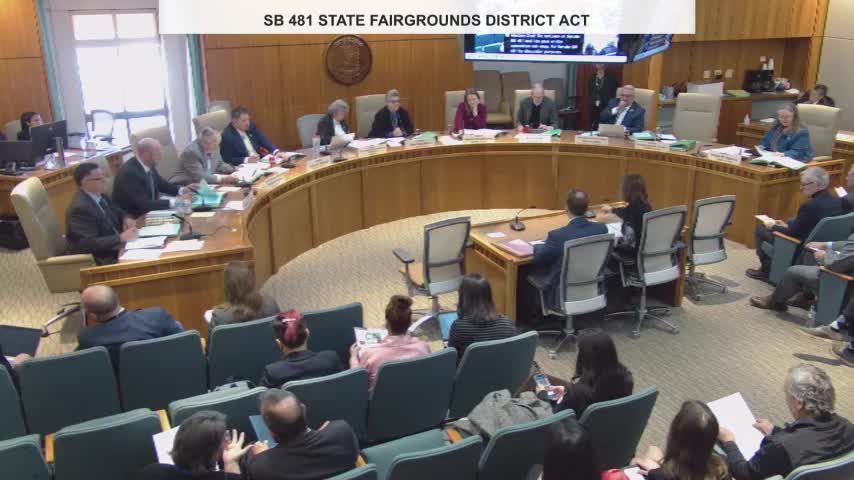Senate committee advances bill to let state create fairgrounds redevelopment district, with limits and oversight
Get AI-powered insights, summaries, and transcripts
Subscribe
Summary
A Senate committee voted 6-3 to advance a substitute for Senate Bill 481 that would allow a state-created redevelopment district over the New Mexico State Fairgrounds to capture state gross receipts tax revenue for infrastructure and development, subject to Board of Finance and New Mexico Finance Authority approval and a 2029 bonding deadline.
Senate Tax, Business and Transportation advanced a substitute for Senate Bill 481 on a 6-3 vote after more than two hours of testimony and debate about oversight, procurement exemptions and community protections.
The bill would authorize a State Fairgrounds District covering the 236-acre fairgrounds in Albuquerque. The district could capture gross receipts taxes generated on site, including a share of racino receipts the sponsor estimated at about $12 million per year, to issue bonds and fund infrastructure and development, subject to approval by the New Mexico Board of Finance and the New Mexico Finance Authority. The bill sets a sunset condition: if the district does not issue bonds by June 30, 2029, tax distributions to the district would terminate and any funds would revert to the state; bond series must mature no later than 25 years and state funding would terminate no later than June 30, 2054.
The sponsor, Senator Michael Stewart, said a master plan funded by a $500,000 RFP already issued by the general services department will propose alternatives for the site and could include moving the fair. "No decision has been made ahead of time," he told the committee, and he described the proposal as a state-level version of a tax increment development district tailored to state-owned land.
Nut graf: Supporters said the tool could finance redevelopment and community benefits for a high-crime, disinvested area east of Central Avenue in Albuquerque. Opponents and several senators pressed for stronger guardrails on procurement, board composition, public reporting and limits on authority.
What the bill would do and guardrails included - Create a State Fairgrounds District that can contract, manage property and impose taxes within its boundaries, and use locally generated gross receipts for district projects. The sponsor said the bill contemplates up to $1 billion of bonding capacity but requires approval by the Board of Finance and NM Finance Authority before bonds may be issued. - Require a district plan that lists estimated costs, maps, financing approaches, anticipated private investment and a timeline; the plan must be reviewed and approved by the Board of Finance. The sponsor and counsel said the legislature would also have to approve bond issuances under the substitute adopted in committee. - Include public transparency requirements: open meetings, published minutes, published budgets and annual reports to the Board of Finance, and a reversion of revenues if bonds are not issued by 06/30/2029.
Key questions raised by senators - Procurement exemption: Senator Sher raised alarm that the substitute exempts the district from the state procurement code. Counsel and the sponsor said many special districts have procurement exceptions but acknowledged members' concern; Senator Figueroa pressed to restore anti-fraud / anti-bribery procurement provisions and asked to see statutory language before floor action. - Oversight and bonding approval: Senators sought clarity about the sequence of approvals. Counsel Justin Horowitz outlined multiple checkpoints — a district project plan, Board of Finance approval of the plan and bond issuance, New Mexico Finance Authority approval of bond documents, and final legislative approval — and said annual reporting and reversion provisions were included to protect state interests. - Board composition and elections: Senators requested that staggered terms and a requirement to hold an election (instead of permissive language) be added so the entire board would not turn over at once. - Use of revenues and initial base: Senators asked how the district would generate sufficient gross receipts to repay bonds; sponsor and counsel said the district could use gaming and GRT generated onsite and the initial bond proceeds would help spur development that in turn creates additional taxable activity.
Public testimony and community input Supporters who testified included Roger Valdez of the Center for Housing Economics, Bernalillo County economic development staff, and Terry Cole, CEO of the Greater Albuquerque Chamber of Commerce. They framed the district as a tool to invest in housing, grocery/pharmacy access and neighborhood revitalization and underscored the need for local community benefits language in the district plan.
Committee action and next steps A motion to issue a "no recommendation" failed 4-5; the committee then voted 6-3 to report the committee substitute with the two rolled-in amendments as a do-pass. The bill advances to Senate Finance with members and staff expecting further amendments addressing procurement, board elections and additional guardrails before floor debate.
Ending: If SB 481 continues to advance, staff said the project plan and RFP process will shape whether the fair stays in central New Mexico and what mix of housing, commercial and public space would be proposed; final bond authority will require multiple state approvals and legislative action.
